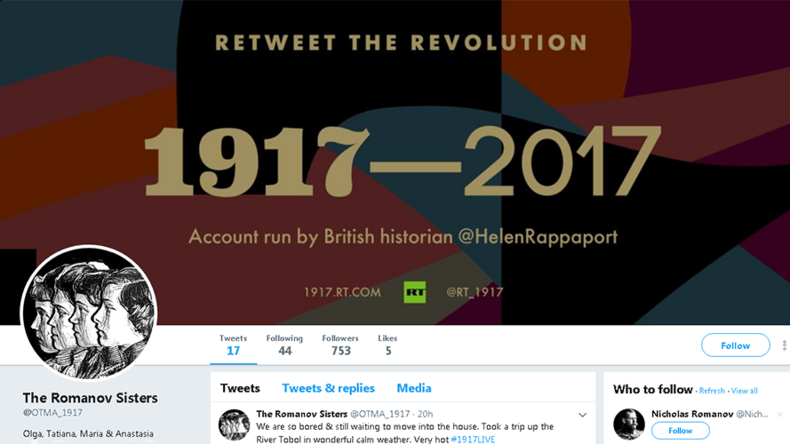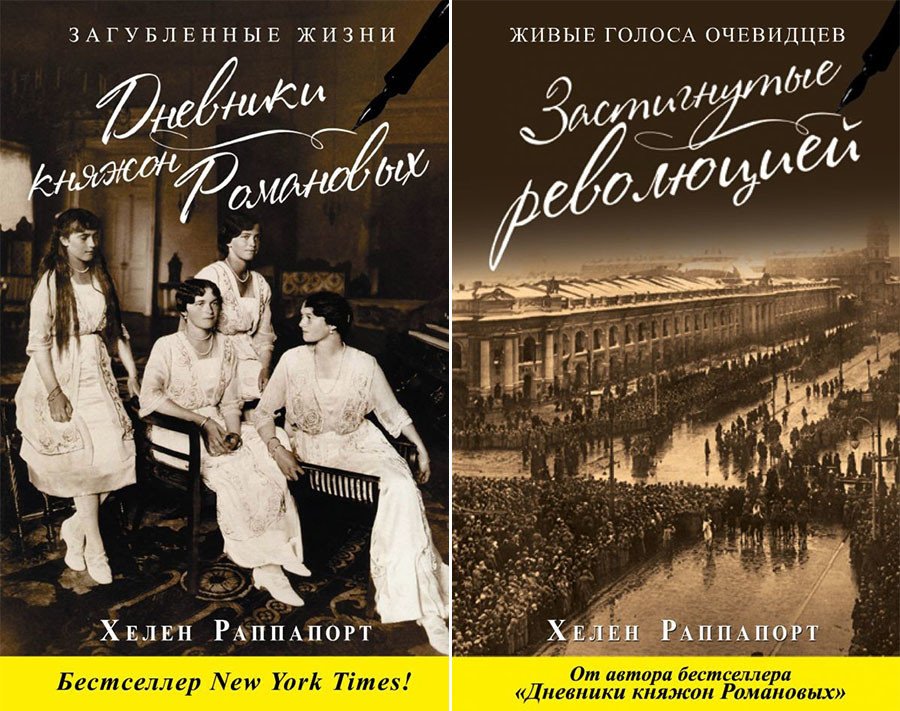British author Helen Rappaport joins #1917LIVE on Twitter, giving voice to Romanov sisters

Helen Rappaport, the author of “Four Sisters,” a book about the tragic fate of the daughters of the last Russian tsar, Nicholas II, has joined RT’s interactive project dedicated to the 1917 Revolution to tweet on behalf of the four teenage girls.
The royal sisters, very diverse in character and age, have often been merged into a blurry image of a band of privileged girls, and that is something Rappaport would like to change.
“Writing Four Sisters (and I chose that title as a deliberate reference to Chekhov’s Three Sisters) was a very special experience for me because I became so absorbed in the lives of those four tragic young women. I wanted passionately to tell their story and give them back their own individual identities,” Helen Rappaport told RT.
Hello, Twitter! This is a group account of Olga, Tatiana, Maria & Anastasia Romanov - daughters of @NicholasII_1917#1917LIVEpic.twitter.com/uCd5AFQklE
— The Romanov Sisters (@OTMA_1917) August 14, 2017
“Too often in the past they have been pushed into the background as an anonymous collective that they weren’t. They were so very different and each had their strengths and weaknesses,” the author explained.
Rappaport confessed to having fallen in love with Russia at an early stage in life through literature and history.
“I remember vividly buying my first book of Russian literature - it was Chekhov’s short stories. I loved “Dama s sobachkoi” [The Lady with the Dog] so much and it sparked something in my imagination. Then there was “Doctor Zhivago,” and Tolstoy’s “Anna Karenina” and his other great works. I also loved Gogol and the Soviet writer Isaac Babel. I became absorbed in the great sweeping narrative of Russian history, and my experience of it was enhanced by the wonderful music of Tchaikovsky, Rachmaninov, Scriabin, Stravinsky and Borodin – as well as the glories of Russian Orthodox church music. I play a lot of Russian music when I am writing.”
#Anastasia I took this picture on my @Kodak Brownie in the mirror, and it was hard because my hands shook #WorldPhotoDay#1917LIVEpic.twitter.com/m9wrIHjDY6
— The Romanov Sisters (@OTMA_1917) August 19, 2017
A Russian speaker herself, Helen Rappaport, is devoted to research and working with the archives.
“Researching in Russian historical sources takes up a lot of time,” she said. “But it is essential to get back to the primary sources and I hate cutting corners. All of my Romanov books have needed a lot of reading of books and materials in Russian – so it has improved my knowledge of the language no end.”
Her other book dedicated to the same turbulent age of Russian history, “Caught in the Revolution”, is an eyewitness account from a foreign perspective onto what went on in the capital in those days.
@AlekseiNR_1917 has hurt his arm & was crying with the pain, Mama took him into her bed for the night. Maria has flu & temperature #1917LIVEpic.twitter.com/S6BOHOiRII
— The Romanov Sisters (@OTMA_1917) August 23, 2017
“There were a lot of interesting foreign women in Petrograd in 1917 who got caught up in events – they were mainly from the British and American colonies, but also some French and Scandinavian women. I tracked down as many female eyewitnesses as I could possibly find. Practically all of them are unknown, bar the suffragette Emmeline Pankhurst,” Helen told RT in an interview.
“Many of them wanted to meet Maria Bochkareva and the Women’s Death Battalion, and some of them even went to the front with them to write stories about them for their newspapers.”
#suffragette Emmeline Pankhurst visits our training center often #1917LIVEpic.twitter.com/mVQOymz88b
— Maria Bochkareva (@bochkareva1917) June 26, 2017
Rappaport’s upcoming book, “The Race to Save the Romanovs”, touches upon an issue very hesitantly covered by non-Russian speaking authors: why the world failed to grant asylum to Russia’s former emperor, his wife and five children who, as a result, were all brutally murdered by the Bolsheviks in 1918.
“To tell the story of what really went wrong, one has to look at the European monarchs and their governments on a much wider level and understand why none of them could or would act to try and get the family out of Russia. There was a huge amount of buck passing, and in all a collective failure to save the Romanovs,” Rappaport explained.
Slept well. After breakfast made 10km trip on steamer up Irtysh River. On returning to Tobolsk had 1st bath in 8 days. Pure bliss! #1917LIVEpic.twitter.com/Tk1gLYa8Li
— Nicholas Romanov (@NicholasII_1917) August 21, 2017
“Everyone failed them: the provisional government, Lenin’s government, the Germans, the British, the Danes, the French – all in different ways. And also the geography, the distances, the weather, i.e. the logistics of getting them out of Russia, made it almost impossible. The only monarch who comes out with any real honor in the story is King Alfonso of Spain,” the author said.

READ MORE: #1917LIVE: Detained Russian tsar & his family moved to Siberia
“There is a huge amount of new and unseen material going into my book, but it has taken an enormous effort and expense to find it. It will cover sources in eight languages: French, English, Russian, German, Spanish, Norwegian, Danish and Swedish. I think, indeed I sincerely hope, that it will surprise people, and will show also that much of what we think we ‘know’ is based on faulty ‘evidence,’” Rappaport said.
Follow RT’s interactive project on Twitter and become part of the strongest and weakest points of one of the greatest Revolutions the world has seen: the turn of the Russian Empire into a communist society all breaking in 1917.












